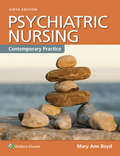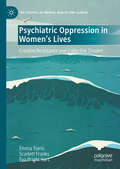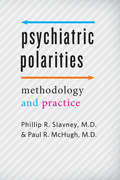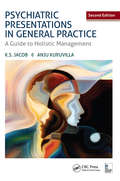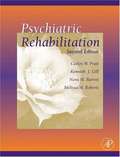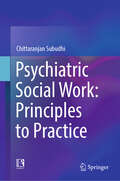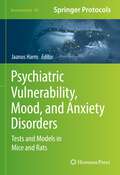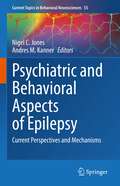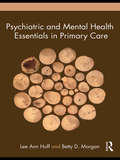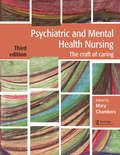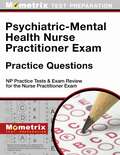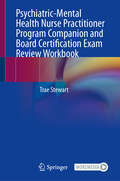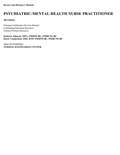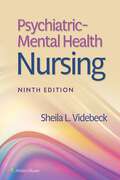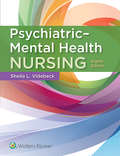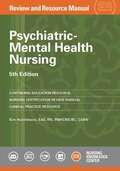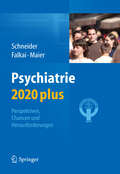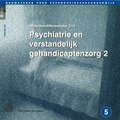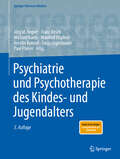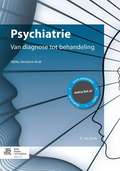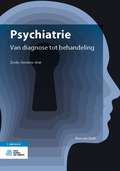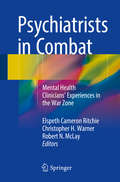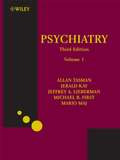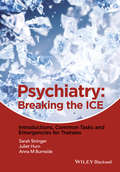- Table View
- List View
Psychiatric Nursing: Contemporary Practice (Coursepoint+ Ser.)
by Mary Ann BoydPsychiatric Nursing: Contemporary Practice 6th edition provides instructors and students a comprehensive, recovery model approach to psychiatric mental health nursing. Mary Ann Boyd presents complex concepts in an easy-to-understand language with case studies, clinical vignettes, and patient experience videos for students to practice and apply psychiatric mental health content.
Psychiatric Oppression in Women's Lives: Creative Resistance and Collective Dissent (The Politics of Mental Health and Illness)
by Emma Tseris Scarlett Franks Eva Bright HartThis book provides a comprehensive analysis of women's experiences within mental health services, demonstrating the need for a radical paradigm shift in how women's distress and experiences are understood. Drawing on extensive fieldwork on coercive mental health treatment, including interviews, participatory action research, arts-based research, and public sociology, the book centres the knowledge, skills, and creativity of psychiatrised women. Informed by intersectional feminism and critical mental health theory, the book explores the interlocking oppressions of psychiatric harm and patriarchal power, alongside women's survivorship and resistances. Areas covered include the pathologisation of women's emotions within mental health services, violence and deprivations in involuntary treatment, the surveillance of mothering, and social exclusions arising from psychiatric diagnoses. The book highlights the ability of collective and creative research processes to move beyond the task of documenting psychiatric harm, towards imagining rich alternatives to biomedical, therapeutic, and carceral practices in mental health. It offers a critique of the notions of ‘benevolence’ and ‘expertise’, which are commonly used to justify psychiatric coercion. It will appeal to students and scholars working across the fields of critical mental health, sociology, social work, psychiatry, mental health nursing and gender studies. Emma Tseris is senior lecturer in Social Work and Policy Studies at the University of Sydney, Australia, researching feminist and critical mental health theory. She is the author of Trauma, Women's Mental Health and Social Justice: Pitfalls and Possibilities (2019) and co-author of Using Social Research for Social Justice (2023). Scarlett Franks is a survivor researcher from the University of Sydney, Australia, who also serves on the Survivor College of the National Centre for Action on Child Sexual Abuse, the board of directors of the Grace Tame Foundation, and the Advisory Panel of the NSW Office of the Anti-Slavery Commissioner. Eva Bright Hart is a feminist survivor researcher from the University of Sydney, Australia. She is a senior social worker and public health professional from a rural area. Eva is also known as a mother, teacher, gardener, cook, author, activist and artist. As a survivor of psychiatric and gendered violence Eva uses a protective pseudonym so she can contribute without the fear of further discrimination, disablement and involuntary psychiatric treatment for herself and her family. Eva means "living one".
Psychiatric Polarities: Methodology and Practice
by Phillip R. Slavney Paul R. McHughA lively exploration of mind and brain, conscious and unconscious, patient and client.In this companion volume to their widely acclaimed Perspectives of Psychiatry, Phillip R. Slavney, M.D., and Paul R. McHugh, M.D., argue that the discontinuity of brain and mind is the source of much of psychiatry’s discord, for it leads psychiatrists to think about their discipline in terms of polar opposites: conscious or unconscious; explanation or understanding; paternalism or autonomy. Psychiatric Polarities brings together the history of ideas and such clinical issues as suicide and bipolar disorder to identify, describe, and debate these and other polar oppositions that arise from psychiatry’s inherent ambiguity.There is no single conceptual perspective that is sufficient for all of psychiatry’s concerns, Slavney and McHugh observe, yet it is both possible and necessary to transcend the denominational conflicts that plague the field. In Psychiatric Polarities, their examination of these conflicts demonstrates how a methodological approach can help to resolve disagreements rooted in partisan commitments.
Psychiatric Presentations in General Practice: A Guide to Holistic Management, Second Edition
by K. S. Jacob Anju KuruvillaMedical schools currently use specialist perspectives on psychiatric disorders to train physicians, nurses and health professionals. This results in a lack confidence among non-psychiatric health professionals, which reduces their ability to manage common mental health conditions in primary care and secondary hospitals. This book is a practical guide to common mental health conditions encountered in general medical practice.
Psychiatric Rehabilitation (2nd edition)
by Carlos W. Pratt Kenneth J. Gill Nora M. Barrett Melissa M. RobertsPsychiatric rehabilitation refers to community treatment of people with mental disorders. Community treatment has recently become far more widespread due to deinstitutionalization at government facilities.
Psychiatric Social Work: Principles to Practice
by Chittaranjan SubudhiThis textbook, Psychiatric Social Work: Principles to Practice, provides a comprehensive foundation for understanding social work’s generalist practice in mental health care. It synthesizes historical and contemporary perspectives into a structured sequence. It addresses key topics such as mental health as a global issue, the importance of psychiatric social work, classifications and assessment of mental disorders and theoretical approaches. It also focuses on models and strategies used in psycho-social rehabilitation, community mental health, and therapeutic communities. Chapter-end questions enhance understanding, while the text combines fresh research with evidence-based practice to promote inclusive development for people with mental illness. The book is an essential read for scholars, educators, researchers, field practitioners, and students of social work, psychiatric nursing, public health, health psychology, and community medicine. It is also invaluable for public health institutions, paramedical staff, health workers, policymakers, and advocacy groups.
Psychiatric Vulnerability, Mood, and Anxiety Disorders: Tests and Models in Mice and Rats (Neuromethods #190)
by Jaanus HarroThis volume looks at classic and novel methods currently used by researchers to understand mood and anxiety disorders and foster precision medicine. Chapters in this book cover topics such as how the sucrose preference succeeds or fails as a measurement of anhedonia; fear conditioning in laboratory rodents; animal models for mania; rodent models for studying the impact of variation in early life mother-infant interactions on mood and anxiety; and prediction of susceptibility/resilience toward animal models of PTSD. In the Neuromethods series style, chapters include the kind of detail and key advice from the specialists needed to get successful results in your laboratory. Comprehensive and cutting-edge, accommodating the novel views on how the neurobiology of psychiatric disorders should be reconceptualized, Psychiatric Vulnerability, Mood, and Anxiety Disorders: Tests and Models in Mice and Rats is a valuable resource for all researchers interested in learning more about this important and developing field.
Psychiatric and Behavioral Aspects of Epilepsy: Current Perspectives and Mechanisms (Current Topics in Behavioral Neurosciences #55)
by Andres M. Kanner Nigel C. JonesMany people living with epilepsy also suffer from debilitating psychiatric and cognitive disorders. While these comorbidities have been recognized for centuries, their causation, and relationship to the epilepsy remains clouded in mystery. This volume highlights recent knowledge and findings as well as controversies in our current understanding of behavioral and psychiatric comorbidities of epilepsy.
Psychiatric and Mental Health Essentials in Primary Care
by Lee Ann Hoff Betty D. MorganPsychiatric and Mental Health Essentials in Primary Care addresses key mental health concepts and strategies for time-pressured practitioners in various healthcare settings serving diverse populations. It offers theoretically sound and succinct guidelines for compassionate, efficient, and effective service to people in emotional and physical pain and distress, capturing the essentials of mental health care delivered by primary care providers. The text provides a theoretical overview, discussing mental health assessment, crisis care basics, alternative therapies, and vulnerable groups such as children, adolescents and older people. It includes chapters that focus on the following topics in Primary Care Practice: Suicide and Violence Anxiety Mood disorders Schizophrenia Substance Abuse Chronic illness and mental health. This invaluable text is designed for primary care providers in either graduate student or practice roles across a range of primary care practice, including nurse practitioners and physician assistants.
Psychiatric and Mental Health Nursing: The craft of caring
by Mary ChambersThis new edition of a bestselling, evidence-based textbook provides a comprehensive overview of psychiatric and mental health nursing. Keeping service users and their recovery at the centre of care, the holistic approach will help nurses to gain the tools and understanding required to work in this complex area. Extensively updated for this new edition, the text looks at: Aspects of mental health nursing: covering topics such as ethics, developing therapeutic relationships and supervision. The foundations of mental health nursing: discussing diagnosis, assessment and risk. Caring for those experiencing mental health distress: looking at wide range of troubles including anxiety, bipolar disorder, eating disorders and issues around sexuality and gender. Care planning and approaches to therapeutic practice: exploring ideas, pathways and treatments such as recovery, CBT, psychodynamic therapies and psychopharmacology. Services and support for those with mental health distress: covering topics such as collaborative work, involvement of service users and their families and carers, and a range of different mental healthcare settings. Mental health nursing in the twenty-first century: highlighting emerging and future trends including the political landscape, physical health and health promotion, and technological advances. This accessible and comprehensive textbook integrates service user perspectives throughout and includes student-friendly features such as learning outcomes, key points summaries, reflection points and further reading sections. It is an essential resource for all mental health nursing students, as well as an invaluable reference for practising nurses.
Psychiatric-Mental Health Nurse (PMH-BC) Certification Review
by Raymond ZakhariPsychiatric-Mental Health Nursing (PMH-BC™) Certification Review is designed to help you prepare for the American Nurses Credentialing Center (ANCC) board certification exam. This comprehensive study aid begins with an overview of the exam, scope and standards of practice, and fundamental theories. It examines topics such as therapeutic treatment and management, patient education, cultural competence, communication, health promotion, and crisis management. A wide range of psychiatric disorders, as organized in the DSM-5, are systematically reviewed in a templated approach that takes the reader through the nursing process step by step. <p><p>Each chapter covers everything you need to know to pass the exam and includes end-of-chapter questions to check your knowledge. The review concludes with a full-length practice test to get you ready for exam day. With over 300 practice questions, detailed review content and answer rationales, and access to ExamPrepConnect, this study aid empowers you with the tools and materials to study your way and the confidence to pass the first time, guaranteed! Know that you're ready. Know that you'll pass with Springer Publishing Exam Prep.
Psychiatric-Mental Health Nurse Practitioner Exam Practice Questions: NP Practice Tests and Exam Review for the Nurse Practitioner Exam
by NP Exam Secrets Test PrepMometrix Test Preparation's Psychiatric-Mental Health Nurse Practitioner Exam Practice Questions are the simplest way to prepare for your Nurse Practitioner Exam. Practice is an important part of preparing for a test and improving your chance of success. <p><p> Mometrix practice questions are designed to prepare you for the real test. You could know everything that is going to be covered on the test but still perform poorly if you have never worked with NP practice questions. Being familiar with the different types of questions and answer choices that you might see on the official test is a big advantage. <p><p> Another benefit of taking practice tests is that you can measure your performance. They help you decide if you need to study and practice more or if you're ready for test day. Doing well on a Mometrix practice test helps you gain confidence that you are prepared. If you struggle, the practice test helps identify areas where you need to work. Using our NP practice test questions allows you to reinforce your strengths and improve your weaknesses. <p><p> Mometrix includes detailed answer explanations for each question. It may sound obvious, but you need to know which questions you missed and why you missed them. This helps you avoid making the same mistakes on the real test. That is why our Psychiatric-Mental Health Nurse Practitioner Exam Practice Questions include answer keys with detailed answer explanations. These in-depth answer explanations will help you to better understand any questions that were difficult for you. <p><p> Mometrix Test Preparation is not affiliated with or endorsed by any official testing organization. All organizational and test names are trademarks of their respective owners.
Psychiatric-Mental Health Nurse Practitioner Program Companion and Board Certification Exam Review Workbook
by Trae StewartEvery year, nearly 5,000 US psychiatric-mental health nurse practitioners (PMHNP) sit for the ANCC board exam. Upon passing, PMHNPs become board-certified and eligible for licensure in their respective states, as well as eligible to apply for a DEA license to write prescriptions. However, the extensive content covered on the board exam often exceeds what is taught in Master's of Science in Nursing programs tailored for PMHNPs. Suitable for both PMHNP students and advanced nurses preparing for board certification, this PMHNP Program Companion and Review Workbook serve as a comprehensive guide from Day 1 of the PMHNP program through exam preparation. The book is structured logically, progressing from fundamental nursing topics (e.g., lab values, ethics, public health) to psychiatric-mental health specific content (e.g., assessment and diagnosis, major psychiatric disorders, psychopharmacology, therapeutic modalities). Additionally, it covers essential advanced practice nursing areas like leadership, quality improvement, and biostatistics. What sets this workbook apart is its interactive approach to learning. Through charts, tables, fill-in-the-blanks, matching exercises, and mnemonics, learners actively engage with the material. Answers and explanations are provided for all practice activities, ensuring comprehension and retention. Moreover, the accompanying Springer Nature Flashcard app offers almost 2,000 practice test questions, allowing learners to access study material conveniently on-the-go via their phone, tablet, or computer. It's an engaging and effective method to reinforce learning. The PMHNP Program Companion and Review Workbook is an invaluable resource for anyone pursuing excellence in psychiatric-mental health nursing practice. Test your knowledge with questions and answers about the book in the Springer Nature Flashcards app.
Psychiatric-Mental Health Nurse Practitioner Review and Resource Manual
by Kathryn Johnson Dawn VanderhoefWritten by experts in psychiatric-mental health nurse practitioner practice, this book provides a clinical reference tool and certification examination preparation. This manual helps readers enhance critical thinking skills and identify strengths and weaknesses.
Psychiatric-Mental Health Nursing
by Sheila L. VidebeckPresenting a practical, student-friendly approach to essential skills and concepts, Psychiatric–Mental Health Nursing, 9th Edition, helps students confidently build a foundation for successful practice. Short chapters and a succinct, straightforward writing style make challenging concepts accessible, and entertaining cartoons and built-in study guide tools engage students while reinforcing their understanding. This thoroughly updated edition reflects the latest evidence-based information and an enhanced focus on clinical judgment to help students master specific nursing interventions, hone their therapeutic communication skills, and effectively apply concepts in any care setting.
Psychiatric-Mental Health Nursing (Coursepoint Ser.)
by Shelia VidebeckA Practical Focus on the Skills and Concepts Essential to Your Success With an accessible, clear and student-friendly approach, Psychiatric-Mental Health Nursing clarifies challenging concepts and helps you build a foundation for working successfully with clients experiencing mental health challenges regardless of care setting. The text explores the full spectrum of psychiatric nursing, helping you master specific nursing interventions, hone your therapeutic communication skills and learn to apply content effectively within the framework of the nursing process. New! Unfolding Patient Stories written by the National League for Nursing put the nursing process in a realistic context to prepare you for successful client interactions and interventions. Clinical Vignettes familiarize you with the features of major disorders you are likely to encounter in practice. Therapeutic Dialogues help you perfect your communication skills with specific examples of nurse-client interactions. Best Practice boxes provide the latest evidence-based findings in psychiatric nursing. Self-Awareness features foster your personal and professional development through self-reflection. Concept Mastery Alerts clarify important concepts essential to your classroom and clinical success. Watch and Learn icons point you to corresponding true-to-life Lippincott® Theory to Practice Video Series videos for a richer understanding of important mental health disorders. Built-In Study Guide reinforces your understanding with multiple-choice questions, multiple-response questions and clinical examples at the end of each chapter. Nursing Care Plans demonstrate effective approaches for addressing specific client disorders. Drug Alerts highlight essential concerns related to psychotropic drugs. Warning boxes alert you to FDA considerations for specific medications. Cultural Considerations help you ensure culturally sensitive care for a wide range of client populations. Elder Considerations sections prepare you to care for the growing population of older adults. Client/Family Education boxes boost your teaching capabilities. Nursing Interventions etail key treatment strategies for specific disorders. DSM-5 Diagnostic Criteria boxes summarize the medical diagnostic features of specific disorders.
Psychiatric-mental Health Nursing Review And Resource Manual, 5th Ed
by Kim HutchinsonAre you looking into how to advance your professional development through certification? Need a reliable and credible reference resource? No matter where you are in the process, make sure you have the most valuable review and resource tool at your disposal. The Nursing Knowledge Center’s Psychiatric-Mental Health Nursing Review and Resource Manual is a must-have tool for nurses planning to take the American Nurses Credentialing Center’s (ANCC’s) Psychiatric-Mental Health Nursing certification exam. Based on the official ANCC certification exam test content outline, this review and resource manual will help you: -Study and analyze comprehensive material and concepts written by nursing experts. -Develop a recommended seven-step plan to equip you for the exam and map out what to do on the day of the exam. -Prepare for and familiarize yourself with psychiatric-mental health nursing standards of practice. -And much more ... Make the Psychiatric-Mental Health Nursing Review and Resource Manual a key resource in your certification preparation.
Psychiatrie 2020 plus
by Peter Falkai Frank SchneiderUnter den medizinischen Disziplinen hat die Psychiatrie und Psychotherapie die größte Zukunft: In den letzten Jahrzehnten hat das Fach in Forschung und Versorgung Quantensprünge durchlaufen. Diese Entwicklung setzt sich fort. Herausforderungen sind die weitere Erforschung und der zunehmende Behandlungsbedarf im Bereich psychischer Erkrankungen. In dem Buch "Psychiatrie 2020" skizziert die Deutsche Gesellschaft für Psychiatrie, Psychotherapie und Nervenheilkunde (DGPPN) neben einer Übersicht über die Entwicklung des Faches eine Vision für das Jahr 2020. Psychiatrie 2020 plus, ist nun die erweiterte und aktualisierte Auflage der Bestandsaufnahme und Vision für das Jahr 2020.
Psychiatrie en verstandelijk gehandicaptenzorg 2: Afstudeerdifferentiatie 514 niveau 5
by De Jong Consulting B.V. J.A.M. Kerstens J.M.F. van der Sluis-HoutkampDifferentiatiekatern voor studenten die in de laatste fase zijn gekomen van de opleiding tot verpleegkundige niveau 5. Het katern is een hulpmiddel bij het afstuderen en reikt verschillende mogelijkheden voor binnen- en buitenschoolse verdieping aan. In de casuïstiek in dit katern komen de eindtermen van deelkwalificatie 514 meerdere malen op verschillende wijze aan bod. Gedurende de BPV toont de deelnemer dat hij/zij in staat is als verpleegkundige zorg te verlenen aan zorgvragers met een psychiatrische ziekte of verstandelijke handicap (514.03). Doelstellingen van dit katern: verdiepen van kennis m.b.t. zorgvragers in de acute en chronische psychiatrie, gerontopsychiatrie en instellingen voor verstandelijk gehandicapten. Verder dient de student vaardig te worden in het professioneel begeleiden van deze zorgvragers en ervaringen m.b.t. zorgvragers te vertalen naar professioneel gedrag in nieuwe zorgsituaties binnen de GGZ.
Psychiatrie und Psychotherapie des Kindes- und Jugendalters (Springer Reference Medizin)
by Franz Resch Jörg M. Fegert Tanja Legenbauer Manfred Döpfner Michael Kaess Kerstin Konrad Paul PlenerKinder- und Jugendpsychiatrie und Psychotherapie und Kinder- und Jugendlichenpsychotherapie haben in den letzten Jahren in der Forschung und Versorgung eine enorme Entwicklung gemacht. Durch die Einführung des Grundständigen Psychotherapiestudiums und der damit verbundenen Einführung einer fachspezifischen Weiterbildung in Kinder- und Jugendpsychotherapie, wird es zukünftig zwei heilberufliche Weiterbildungsgänge im Bereich der psychischen Gesundheit von Kindern und Jugendlichen geben. Die Neuauflage der Kinder- und Jugendpsychiatrie und Psychotherapie mit zahlreichen neuen Themen und fast komplett neuen Texten, spiegelt diese Entwicklung wider. Hierfür wurde das Herausgeberboard und das Autorenteam deutlich erweitert. Ausgewiesene Kinder- und Jugendlichenpsychotherapeutinnen und Psychotherapeuten sind gleichberechtigte Mitherausgeber. Insofern steht das Buch in der Tradition des Springer-Referenzlehrbuchs, ist aber dennoch weit mehr als eine dritte Auflage der Kinder- und Jugendpsychiatrie und Psychotherapie, denn hier wird kooperativ und interdisziplinär das Fachgebiet der Psychiatrie und Psychotherapie des Kindes- und Jugendalters präsentiert. Die Fülle an Information und Wissen ist ein unerlässliches Werkzeug für die tägliche Arbeit von Assistenzärzt*innen, Fachärzt*innen, Assistenzpsychotherapeut*innen in Fachweiterbildung Kinder- und Jugendpsychotherapie, Kinder- und Jugendlichenpsychotherapeut*innen in Ausbildung, Psychotherapeut*innen und Psycholog*innen und Sozialarbeiter*innen, auch in angrenzenden Fachgebieten. Das Buch beschreibt Schulen übergreifend die am besten geeigneten Therapieverfahren und bietet einen evidenzbasierten Handlungsleitfaden für alle, die in ihrem beruflichen Leben mit Kindern und Jugendlichen mit psychischen Störungen zu tun haben. Bedingt durch diese inhaltliche Ausweitung und angesichts der Fülle neuen Wissens, wurde zwar die klare Struktur und didaktische Aufbereitung im Lehrbuch beibehalten, gleichzeitig wurde das Buch in zwei Teile aufgeteilt. Ein allgemeiner Teil und ein spezieller störungsspezifischer Teil wird in zwei Bänden präsentiert, die durch die gleiche Struktur und didaktische Merkmale alle Leser*innen bei der Orientierung im Text unterstützen.
Psychiatrie: Van diagnose tot behandeling
by R. van DethPsychiatrieVan diagnose tot behandelingDit boek geeft een overzicht van de moderne psychiatrie in al haar facetten. Het eerste deel beschrijft de wetenschappelijke principes en methoden van de psychiatrie. Daarbij wordt op evenwichtige wijze aandacht geschonken aan biologische, psychologische en sociale invalshoeken. In het tweede deel staan de voornaamste psychische stoornissen centraal. Aan de hand van praktijkvoorbeelden komen daarvan telkens de essentiële kenmerken, verklaringen en behandelvormen aan bod.Het boek probeert jargon zoveel mogelijk te vermijden en is in heldere taal geschreven. Het is dan ook bedoeld voor iedereen die op een snelle en toegankelijke manier kennis wil maken met het psychiatrisch werkveld. Dat kunnen studenten zijn of geïnteresseerde leken, maar ook mensen met psychische problemen en hun directe omgeving. Verder is het boek heel geschikt voor wie beroepshalve met de wereld van de psychiatrie te maken krijgt: zorgprofessionals, maatschappelijk werkers en personeelsmanagers, maar ook degenen die werken bij politie en justitie of in het onderwijs. Mede op basis van de DSM-5 is deze vijfde herziene editie in veel opzichten geactualiseerd. Daarnaast biedt nu ook een website ondersteunende (internet)bronnen bij ieder hoofdstuk. Drs. Ron van Deth is psycholoog en publicist en verbonden aan het Europees Instituut voor Educatie in Driebergen.
Psychiatrie: Van diagnose tot behandeling
by Ron van DethDit boek biedt een toegankelijk overzicht van alle facetten van de moderne psychiatrie: van diagnose tot behandeling. Daarbij wordt nadrukkelijk ingegaan op innovatieve bewegingen in de Nederlandse GGZ, zoals eigen regie, herstel, gezamenlijke besluitvorming, zelfmanagement en ervaringsdeskundigheid. Het boek is gericht op iedereen die in zijn werk of studie te maken krijgt met psychische problematiek.De zesde druk van Psychiatrie: Van diagnose tot behandeling is inhoudelijk verbeterd, geactualiseerd en uitgebreid, waardoor het completer is geworden. De nieuwe opmaak met tal van illustraties maakt het boek aantrekkelijker en overzichtelijker. In ieder hoofdstuk is een studieblok opgenomen met samenvattingen, kernbegrippen en doelen. Ook biedt deze editie studenten ruime mogelijkheden om hun kennis en inzicht te oefenen en te toetsen met flashcards én 260 multiplechoicevragen. De uitgebreide website bij dit boek heeft behalve links naar video’s, films, websites en boeken, ook videoclips die belangrijke aspecten van de hoofdstukken toelichten. Door deze toevoegingen offline en online is het boek uitermate geschikt als studiemateriaal.Een ander belangrijk nieuw element zijn de psycho-educatieve teksten. Deze maken duidelijk wat zorgprofessionals te bieden hebben, maar vooral wat cliënten en hun directe omgeving zélf kunnen doen. Hiermee richt het boek zich ook op mensen met psychische problematiek.Psychiatrie: Van diagnose tot behandeling is geschreven door drs. Ron van Deth. Hij is psycholoog en publicist en verbonden aan het Europees Instituut voor Educatie in Driebergen. Hij was jarenlang eindredacteur van PsychoPraktijk en schreef onder andere Psychotherapie: Van theorie tot praktijk, Inleiding in de psychopathologie en (als co-auteur) Pedagogische adviezen voor speciale kinderen.
Psychiatrists in Combat
by Elspeth Cameron Ritchie Christopher H. Warner Robert N. MclayThis book tells the professional and personal experiences of American military psychiatrists and their colleagues in the longest conflict in American history. These highly trained men and women treat service members for the psychological consequences from their experiences in battle, including killing enemy combatants; seeing wounded and killed civilian casualties; losing their friends in combat; factoring in personal mental health needs, including psychiatric drug treatment; and potentially dealing with their own physical injuries from being shot or blown up. The volume consists of 20 short first-person case studies from the mental health providers who have been risking their lives while treating patients in the battlefield since 9/11. Written by expert psychiatrists who have experienced these challenges directly, this texts offers both a clinical and personal account that is not found anywhere else. Topics include tips on providing psychotherapy in battle, evaluating and treating detainees in war prisons such as Abu Ghraib and Guantanamo Bay, and the unique challenges of prescribing medication to patients who are also comrades in war. Psychiatrists in Combat is uniquely positioned to be a valuable resource for psychiatrists interested in trauma and veterans, psychologists, social workers, occupational therapists, military health personnel, and mental health professionals interested in military psychiatry.
Psychiatry
by Michael B. First Jeffrey A. Lieberman Mario Maj Allan Tasman Jerald KayExtensively revised and updated this edition reflects the progress and developments in the field. With 127 chapters and over 400 contributors this book is a truly comprehensive exposition of the specialty of psychiatry.Written by well-known and highly regarded experts from around the world, it takes a patient-centered approach making it an indispensable resource for all those involved in the care of patients with psychiatric disorders.For this new edition, the section on the Neuroscientific Foundations of Psychiatry has been completely revised, with a new author team recruited by Section Editors Jonathan Polan and Eric Kandel. The final section, Special Populations and Clinical Settings, features important new chapters on today's most urgent topics, including the homeless, restraint and geriatric psychiatry.Key features include:Coverage of the entire field of psychiatry, from psychoanalysis to pharmacology and brain imaging, including family relations, cultural influence and change, epidemiology, genetics and behavioral medicineClinical vignettes describing current clinical practice in an attractive designNumerous figures and tables that facilitate learning and comprehension appear throughout the textClear comparisons of the DSM-IV-TR and ICD-10 criteria for easy understanding in a global contextDiagnostic and treatment decision trees to help both the novice and experienced readerThe chapter on Cognitive Behavioral Therapies by Edward Friedman, Michael Thase and Jesse Wright is freely available. Please click on Read Excerpt 2 above to read this superb exposition of these important therapies.
Psychiatry
by Sarah L. Stringer Anna M. Burnside Juliet HurnPsychiatry: Breaking the ICE contains everything psychiatry trainees need in order feel confident and competent in general adult inpatient and community placements. A practical and reassuring guide to life as a psychiatrist, structured around the tasks expected both in day-to-day practice and in out-of-hours work Key themes running throughout the book include ethical and legal issues, risk assessment and management, patient experience and safe prescribing The authors are closely involved in the training, mentoring and supervision of core trainees, and know the real-world challenges faced by junior psychiatrists
